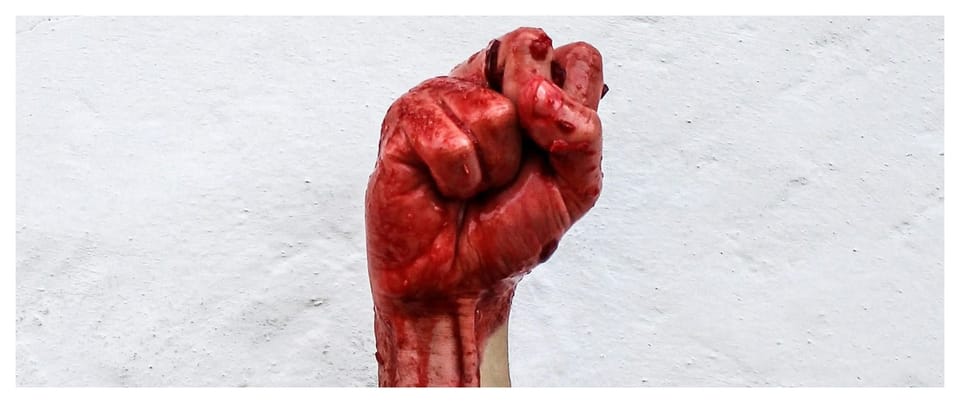Punching Bag, Empty Chair.

The chair opposite me was full: broad shoulders, gym-cut arms, the faint shine of nerves across his brow. Behind him stood a cartoonish punching bag — swollen chest, absurd biceps — like a Michelin man on steroids. Boxing gloves lay splayed on the floor where he’d dropped them. He gave me a nervous grin, polite, unsure. First time in therapy.
He hadn’t come to talk about sales targets, though he was brilliant at those. He hadn’t come to flex his way through an hour either. He came because of a woman. His wife — young, striking, a salsa dancer. He found himself watching her dance with other men and spiralling into jealousy. Not the mild type. The kind that gnawed at him, rewinding old betrayals in his head. His last partner had cheated. He could still feel the sting of being the fool, imagining it happening again under the guise of Latin music and hip rolls.
The backdrop was Haifa. Sales floors. Bright glass offices. Air so thick with tension you could smell it. Target sheets on walls, coffee gone sour, managers prowling. I knew that world too well. It reminded me of Glengarry Glen Ross — grown men reduced to barking dogs for scraps of commission. He was different, though. Not the hard-nosed bully-closer. He had charm, timing, and that slow-burn persistence that makes people sign on the dotted line without feeling shoved. The rare kind who doesn’t stall out mid-career. He was going places, I could see it.
But sales wasn’t the root. We dug back. His mother, a young and restless self confessed party girl, had taken him from Israel when he was still a boy. One day he had a father he adored; the next, gone. She dragged him and his younger brother to northern England, new accent, new school, new man in her bed. The stepfather was brutal. Fists, threats, the kind of violence that picks favourites. His little brother bore the brunt.
Joshua told me about one afternoon when the stepdad’s fists were raining down on the boy again. Something snapped. Joshua grabbed the man by the throat, pinned him to the wall, and for the first time saw fear in his eyes. A teenager staring at his abuser’s panic, learning in that second that he had agency. That lesson burned in deeper than any school test.
That urgency carried forward. Into the gym, into sales, into the marriage. Drive like a live wire. Always climbing, proving, refusing to be small. You could almost see the circuit board under his skin: power, humiliation, revenge, achievement, repeat.
And then war.
It wasn’t abstract. He’d already served his compulsory stint in the army, knew the terrain, the protocols, the weapons. Now it was live again. Suddenly our sessions weren’t about jealousy. They were about survival.
He told me what they had to watch on secret channels. His face contorted, his voice was shivering. Friends tortured on camera. Young women dragged into vans on the streets of the city, filmed in the desert as they were brutalised and buried alive. Coordinates hidden in the footage, a sick game: soldiers had to watch carefully, looking for clues, then dispatched to try and dig them out before it was too late. Designed to seed terror. Designed to rot the mind from the inside.
He carried those images back into his nights, into his wife’s arms, into the quietest corners of his house. Sleep fractured. Anguish thick in his throat.
One session sticks. We were paused in reflection when the siren went off. The sound piercing the silence— metallic, urgent, unarguable. Joshua was on his feet in an instant, moving like a drill, shouting for his wife. I watched him disappear through the door, steps pounding. I sat there with the empty chair, the cartoonish punch bag flexing its plastic grin, gloves still on the carpet. The space buzzing with urgency.
The through-line wasn’t hard to trace. A boy stolen from his father, a teenager who’d wrestled back power, a man who learned to turn that drive into cash and respect. Then thrown again into systems designed to crush agency — the sales floor, the battlefield, even the salsa club. Each one demanding a performance, each one whispering betrayal.
The insight? Power doesn’t vanish. It gets buried, stolen, outsourced — but it waits. Joshua knew that since the day his hands closed around his stepfather’s throat. That same sense of agency was there in the sales pitch, in the marriage arguments, in the split-second sprint for the bomb shelter. What he hadn’t worked out yet was how to hold that power without it being forged in violence or fear.
One session ended differently. I referenced a city, almost off-hand, tying it to one of the horrors he’d described. He froze. His eyes cut straight through me — sharp, suspicious. In that glance, I felt the trust go, vamoose, gone.
He didn’t shout. He didn’t explain. An inner movement then a silence that stretched, and with it the air shifted, became denser. The thread we’d been walking on snapped. He was scanning me now, not talking to me. Measuring risk, weighing what I knew, who I might tell.
The punching bag still stood there, gloves on the floor, but the room felt altered, as if the walls had leaned in, the air now stale. Our work, which had been full of heat and movement, was suddenly static.
Therapy ends that way sometimes. Not with a breakthrough. Not with a fight. Just with suspicion that can’t be undone. I knew then it was over. My job wasn’t to repair it anymore. My job was to close it down neatly, to give him a way out without humiliation.
That was the last session. The chair never filled again.

Member discussion